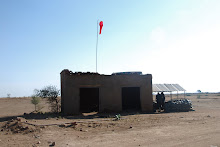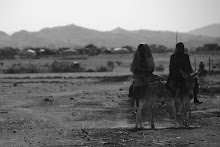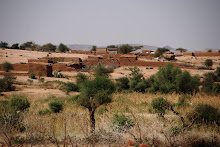“Generally speaking, genocide does not necessarily mean the immediate destruction of a nation… it is intended rather to signify a coordinated plan aiming at the destruction of essential foundations of the life of national groups, with the aim of annihilating the groups themselves. The objectives of such a plan would be the disintegration of the political and social institutions, of culture, language, national feelings, religion, and the economic existence of national groups, and the destruction of the personal security, liberty, health, dignity, and even the lives of the individuals belonging to such groups.”
Raphael Lemkin, credited with coining the word 'genocide,' 1943
A warrant for the arrest of President Bashir (indicted by the ICC on crimes against humanity, war crimes, and genocide in July) is expected any day, and it’s making everyone jumpy. It’s also ensuring that the topic comes up a lot in conversation– is Darfur, or is it not, properly called genocide?
Given that Ocampo, the ICC prosecutor, has staked his reputation and possibly the courts very survival on this case, I imagine he holds a ‘smoking gun’ piece of evidence on the subject. But, from what the international community has seen in the last few years, I think Darfur is genocide mainly in the second part of the definition - the long term destruction of a culture, leadership institutions, livelihoods, and way of life.
Humanitarians estimate that as many as 10,000 people were displaced this week alone in South Darfur, with the number killed in the 20’s and 30’s (The numbers of displaced in Darfur have consistently been far greater than those killed). Imagine rural America – Wyoming and Utah for example, as the last frontier of the American West – and swaths of people, 10,000 at a time, forced off their land and to the edges of Salt Lake City until 2.5 million people were camped out. The economy ceases to function, land is up for grabs, herds, gene pools, and knowledge die off, infrastructure is destroyed or abandoned, irrigation systems collapse and the land reverts to the wild. Social organization unwinds and people’s self-worth and faith in humanity is tested. Resentment builds and identities change.
But, if I take only those criteria, then Darfur is genocide by ultra rapid (albeit, targeted) urbanization. Across Africa communities are abandoning traditional fields for city slums in reaction to a group of push and pull factors similar to those in Darfur. Environmental degradation and population growth are reducing productivity and increasing competition in the country side. Rumors of wealth and jobs (often at international companies and organizations) to be found in urban areas are pulling people to the city centers, where they find the reality does not always match their expectations.
New arrivals at displaced camps here in Darfur are often happier than you would expect them to be – awed by the new people and surroundings, treated as guests by their fellow camp-mates, telling their story to people who care, and expecting food and schooling. The reality of the tedium and degradation of displaced life takes a little while to set in. And the possibility of returning dims as instability increases, land ownership is confused and social ties mixed-up.
We tend to think of refugees as temporary, but they are much more often permanent. When there is finally peace in Darfur, the challenges faced by the population will be very similar to those around the world – building habitable cities and adapting to modern legal and cultural institutions.
The violence in Darfur is unique and very real, but the effects are at least comparable to the rapid and increasingly desperate urbanization happening around the developing world - does the fact that one group of people is forcing another into this situation qualify it as genocide?
Wednesday, October 15, 2008
Subscribe to:
Post Comments (Atom)













































No comments:
Post a Comment